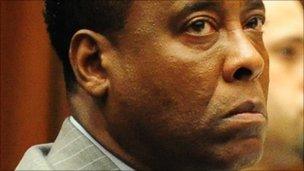Jackson fans immersed in doctor's manslaughter trial
- Published

Dr Murray denies charges of involuntary manslaughter
Every day is a lottery at the trial of Conrad Murray, Michael Jackson's doctor, who stands accused of killing perhaps the world's most famous singer.
Jackson fans line up against the courtroom wall at 07:30 every morning in the hope of winning a draw for one of the few seats in the public gallery.
Like millions of others across America and the world they could watch it on the internet or on TV, but there is obviously something more to be gained from being there in person, sitting just a few feet from the lawyers, the family and the accused.
I joined the draw two days in a row - second-time lucky - to get a feel for the courtroom and to immerse myself in a trial that has been creating a buzz across America.
It was an interesting day to sit in on the trial.
It was a day which began with what the TV pundits called a "cornerstone of the defence" being pulled away, and went on to hear some damning accusations of "gross negligence" against the man whom Michael Jackson trusted as his doctor.
Discarded theory
Before proceedings even began, before the 16 men and women of the jury had been buzzed into their seats, the defence had conceded Michael Jackson could not have drunk the drug which killed him.
Propofol is what it the trial all about.
It is is an extremely strong sedative and Michael Jackson was having his doctor use it to help him get to sleep.
It was a combination of that and a number of other sedatives which caused his death - and as the man prescribing the pills, injections and intravenous drugs, Conrad Murray stands accused of causing his death by involuntary manslaughter.
One key line of defence is that Michael Jackson took the drugs himself, when his doctor was not looking.
A presumption made by the countless commentators, TV experts, ex-prosecutors and journalists was that Michael Jackson drank the drug. But research by both the prosecution and the defence proved it was only effective if injected straight into the blood.
And so a line of questioning defence lawyers may have used, and indeed hinted they would use, was dropped - but not the theory of self-medication altogether.
Jackson could have injected himself, or taken other pills, but that is for another day of evidence or for when the defence case begins.
'Unethical'
But this day was all about independent medical experts and their professional opinion of Dr Murray. They were not impressed.
For much of the day cardiologist Dr Alon Steinberg was in the stand, describing how he had reviewed Dr Murray's own account of what happened the night Michael Jackson died, as told to a detective.
He outlined six separate instances of what he called "gross negligence."
"Propofol should never be given as a sleeping drug," was his premise, explaining it was a strong sedative used as an anaesthetic in surgical operations and its use in this way was negligent and unethical.
Once given the drug, Michael Jackson should have been monitored properly, all the time, with heart and blood pressure monitors, back-up drugs and equipment in case anything went wrong.
And perhaps most damning of all, he said the way Conrad Murray reacted when Jackson stopped breathing was "responsible for the singer's death".
By not immediately calling the emergency services, taking the wrong action in those vital few minutes and not having prepared for an emergency, he had made "a direct contribution to Michael Jackson's death", Dr Steinberg told the court.
Basic procedure
The second witness, Professor Nader Kamangar, was equally critical of the use of such a powerful sedative which he said required proper training and was usually given in a hospital or clinical environment, not in someone's home.
He also reviewed Conrad Murray's account of what happened, and as a sleep medicine expert stressed propofol should not be used for insomnia.
The two independent witnesses helped build up a strong picture of a poor doctor who did not follow basic procedure and was negligent.
It is a picture the defence will be keen to undermine in the cross-examination of Prof Kamangar, with the prosecution continuing to build its case against Conrad Murray as the trial approaches its half-way mark.
Meanwhile the Jackson fans will keep on arriving for the daily lottery, to secure one of those precious seats in the courtroom.
- Published12 October 2011
- Published8 October 2011
- Published30 September 2011